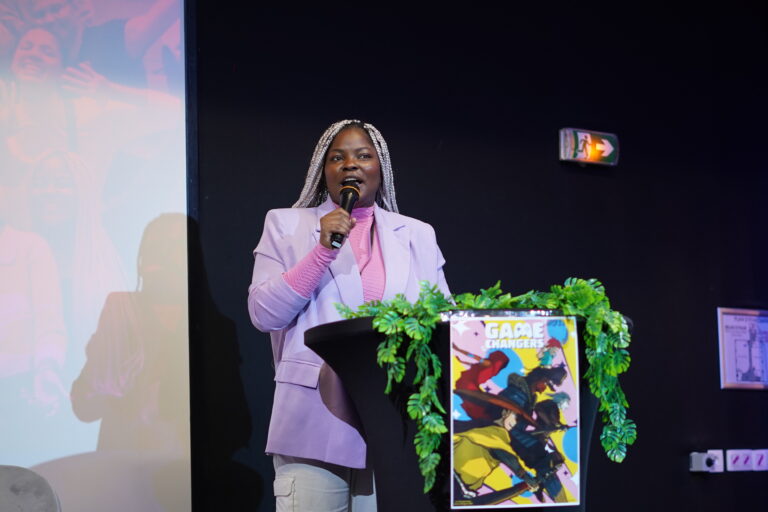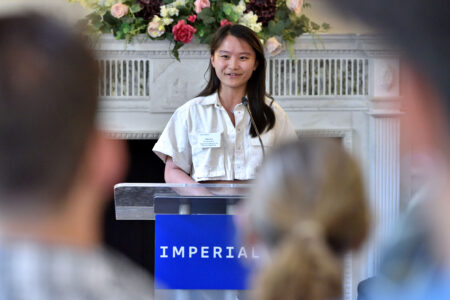
Most women experience gender-specific discrimination when gaming.
More than three-quarters of women (77%) reported name-calling, receiving inappropriate sexual messages, gatekeeping, and dismissiveness, according to 2022 data from Reach3 Insights.
28% of online multiplayer gamers who experienced in-game harassment avoided certain games due to their reputations for hostile environments, reveals data from another report. In the same survey, 22% stopped playing certain games altogether.
Jennifer Lufau is not one of them.
Born in Togo, Lufau’s family moved to neighbouring Benin, where she spent her middle school years.
There, she stumbled upon a cyber cafe and learned of the world of video games and the gaming community beyond those on her Windows computer.
“The first thing I saw was the icon for ‘Prince of Persia’ – the very first instalment from 1989,” says Lufau. “I started playing it right there, and it clicked inside me because I had no idea there could be a storyline told within games.”
From that moment, Lufau’s world was changed – and it was about to get much bigger.
When her family relocated to France, Lufau discovered another side of gaming: online multiplayer. In particular, she had been introduced to League of Legends (LoL).
LoL is a multiplayer online battle arena comprising two teams of five. The New York Times explains it as “at its most basic level, LoL is a game of capture the flag, though that is a bit like describing brain surgery as ‘a medical procedure.’”
This game is one of the biggest titans in esports, with its championships racking up more views than the Super Bowl in 2019.
It’s also one of the gaming community’s most toxic, according to a 2024 study.
Still, after spending around 16 years playing the game, Lufau isn’t deterred from it. In fact, she’s more determined to stay than ever.
The question is, why?

During her bachelor’s degree, Lufau spent three months abroad learning Chinese language and literature at the National Cheng Kung University in Taiwan. Source: Jennifer Lufau
‘I would get insults just because I’m playing a dark-skinned character’
Lufau realised a few stark problems in gaming when she first played “Prince of Persia.”
“I was in the position of a character that had to go through hell to save a princess,” she says. “And it was always a princess that I would barely see in the game. I remember thinking back in the day, ‘Who is this princess, and why can’t I see her?’”
The lack of female characters in the games, alongside the perception of female characters that heavily revolved around the damsel-in-distress trope, was just the beginning of it all.
In games where you could customise your avatar, it was always difficult for Lufau to create a character of her colour.
“I would very rarely see my colour, and sometimes, the maximum shade of dark I could get to was grey,” says Lufau. “Like, come on, these are games, and it’s just a question of colour, so why wasn’t it possible?
Then, there was the toxicity.
Lufau recalls that her first experience of racism was through gaming – sometimes, just from playing a dark-skinned character. Even having a gaming alias like “BlackQueen17” prompted insults.
“‘BlackQueen’ gives it away immediately that I’m a girl and I’m also Black, which would apparently be a reason for others to insult me,” says Lufau. “I could never have expected that to happen while playing games because I was just there to have a good time.”
As a teenager who only had positive experiences gaming so far, this negativity was shocking.
It was even harder on Lufau, who, at that time, could not share her troubles regarding her hobby with anyone else in real life since no one could understand where she was coming from.
The worst part came during a face reveal with her online friends, with whom Lufau has been on voice-only chat. They were “flabbergasted to see my face,” she says.
“They were like, ‘Woah, I was not expecting this because your voice is so sweet and soft, I would never expect you to be Black,’” shares Lufau. “I was like, what does that mean? Where did that come from?”
Those experiences opened the doors for Lufau to explore what diversity, equity, and inclusion (DEI) in gaming could be like.

The first game that blew Lufau’s mind was “Prince of Persia,” developed by Ubisoft. Years later, Lufau would have the opportunity to work at the company. Source: Jennifer Lufau
In 2020, amidst the COVID-19 pandemic and the George Floyd protests, Lufau made her move. Specifically, it was the start of a blog where she would share her stories and encounters in games.
“Many people don’t know about these experiences, and I couldn’t find online testimonies about girls playing games or Black women playing games,” she says. “So, I decided I was going to share it myself.”
One of Lufau’s first blog posts comprised four interviews with Black women from Madagascar, the US, the Netherlands, and Canada.
Writing the interviews was like looking into a mirror.
“Their experience was so, so similar to mine that I realised that this was a thing,” she says. “I’m not completely crazy and there is something ongoing in the gaming community, and I want people to know more about it.”
Through that, Lufau founded Afrogameuses, a groundbreaking French community and non-profit with a mission to elevate Black women and queer individuals in gaming.
While Lufau did not identify as queer at the start of Afrogameuses, she knew it was a community she wanted to extend a helping hand to.
“I realised that there were so many people who didn’t find their community in the gaming space who needed it, and I wanted them to feel seen, heard, and included,” she says. “There was just no way I could let them wait on the side.”
Having queer people around her helped Lufau in her own journey too, as she now identifies as queer.
“There’s so much learning you get to do when you start chatting and hanging out with people who are different or identify differently,” says Lufau. “It’s been a journey of learning and listening a lot, which helps understand others.”
This, she emphasises, has always been a huge part of growing and building a community like Afrogameuses.

What started as a simple blog post about her experiences gaming as a Black woman has shaped Lufau’s path as a diversity, equity, and inclusion consultant. Source: Jennifer Lufau
A message to gaming developers: ‘Representation matters.’
Lufau works as a DEI consultant for gaming studios, helping them create inclusive content, characters, and stories for their games.
“Many people who create games have good intentions,” says Lufau. “They can be a team of 15 white dudes making a game about an African country, and I’d say go ahead, but please do it well and do it with the right people who can help you because representation matters.”
“Remember that there are people who are part of this demographic who will be expecting to find this authentic side in your game.”
This isn’t too Herculean a task. After all, technology has advanced leaps and bounds in the last decade alone, so there’s no excuse or reason not to create diverse characters and stories.
“We have the people who have the competence and the skills to create these worlds,” says Lufau. “We also know that having diverse characters and universes in these games will definitely help the younger generations.”
Nintendo’s iconic Mario franchise has done it after years of playing into the damsel-in-distress trope. Princess Peach, whom Mario heroically saves from Bowser, became her own protagonist in “Super Princess Peach” and “Princess Peach: Showtime!” respectively – much to fans’ excitement.
And if a giant like Nintendo can do it, what’s stopping everyone else from doing it?
“I believe that gaming has the power to change the world because it’s one of the most interactive media ever that helps people understand what it’s like living in the skin of somebody completely different from you,” says Lufau. “This is why we also need to have more stories so that people can experience them.”

Lufau seeks to empower the next generation of creators to infuse their work with inclusion and meaningful storytelling. Source: Jennifer Lufau
So far, Lufau’s clients include developer Twin Drums studio and their afro-fantasy multiplayer online role-playing game, “The Wagadu Chronicles,” and Adam Kareem’s “Protodroid DeLTA,” a 3D platformer featuring a colourful cast of characters.
Still, Lufau knows that a minority of people within the gaming community will always be dissatisfied with the results of more diverse and inclusive games.
Take the upcoming release of “Assassin’s Creed Shadows,” for example.
This 2025 release will be the series’s 14th major instalment. The setting is in 16th-century Japan towards the end of the Sengoku period. It features two protagonists: Naoe, a female shinobi, and Yasuke, an African samurai inspired by the historical figure of the same name.
The dissent was immediate.
While the real-life inspired Yasuke was the main target behind the petition to cancel the game due to historical inaccuracies or other reasonings, the fictional Naoe – or Ubisoft, really – had to fend off her share of strife for her gender alone.
“There are people complaining about the lack of the ability to play a Japanese character in the game, but she’s literally there,” says Lufau. “Anyone can play as a female character. Women have been playing as male characters all this while.”
At the end of the day, it’s about not giving up this particular fight.
“These are gamers who have always been able to play games where they could see themselves,” says Lufau. “They want to silence marginalised people into not taking space, and we’re doing the exact opposite. So that’s why I think we’re gonna take a lot of wins in the future.”

When she couldn’t find anyone who could relate to her experiences in gaming, Lufau decided to foster her own gaming community. Source: Jennifer Lufau
What winning looks like for a DEI gaming community
Beyond her work with gaming developers, Lufau’s most significant accomplishment as a champion of DEI gaming is seeing how her work with Afrogameuses has allowed people to feel seen, heard, and represented.
“Knowing that because we exist and because of the work we do, someone managed to get a job in game development or started streaming, all because they found a community that supported them,” says Lufau.
It’s been a full-circle journey, and while the road ahead might be hard, Lufau knows that the work and effort are worth it.
“I started all this because I was lonely and felt like I was the only one playing games,” she says. “Ultimately, it was a selfish motive that led me to create this community because it didn’t exist before, and I wanted that for me. But now, it’s serving other people too.”
But Afrogameuses is just one part of the bigger picture that Lufau is championing for DEI gaming, and she won’t stop until she’s carved out a space for everyone to feel seen.
This mission is reflected in Lufau’s choice of academic degrees too.
For her bachelor’s, her love for languages drove her to pursue a degree in applied foreign languages in foreign trade at the Université Paris-Est Marne-la-Vallée in France.
“I realised that languages could change something because learning English while gaming helped me communicate with people from around the world,” she says.
To fully immerse herself in her studies, she went on exchange programmes to Spain and Taiwan to learn Spanish and Mandarin. Sometime after her undergraduate degree, she spent a sabbatical year in Shanghai, China, where she spoke in Mandarin daily as she sold French wine to customers.
Currently, Lufau has added Korean and German to her language repertoire too.
It’s the belief that being willing to speak to people in their languages is a way to speak to their hearts. “It shows your effort, that I really want to understand you, so I’m going to learn your language for us to communicate in the best way possible,” she says.
All of this only scratches the surface of her academic accomplishments.
Lufau went on to earn a master’s degree in international project management at France’s Université Sorbonne Nouvelle. Her master’s thesis was on video games as a tool for innovation – an apt paper for her work thus far.
Next, she earned an MBA at Devinci Executive Education.
“People believe in this, and so I will never give up on the work we’re doing because I’m not doing it for myself,” says Lufau. “I’m doing it for these people who believe this should happen.”
Of course, you can’t end a talk with a gamer without asking about their favourite games. For Lufau, these were the ones that shaped her life the most and provided an enjoyable time playing.
First place goes the game of her teenagehood, “LoL.”
As a place where she met many friends and incredible people and learned the most about herself despite how turbulent things got, it had to be on the list.
The classic fighting game “Tekken” allows you to play with just about anyone – whether it’s a random person or those closest to you. It could be played anywhere too, from computers to consoles, like the Xbox that Lufau convinced her mum to get for her and her siblings.
“In the end, the whole family was using it, and we spent a lot of time playing ‘Tekken’,” she shares.
Third place goes to “Prince of Persia,” a love reignited after Lufau’s playthrough of the latest January 2024 release, “Prince of Persia: The Lost Crown.”
And last but not least, an honourable mention had to go to “Assasin’s Creed.”
“The stories and the immersion are incredible,” says Lufau. “I think we all felt we were taking a history lesson while playing the game.










